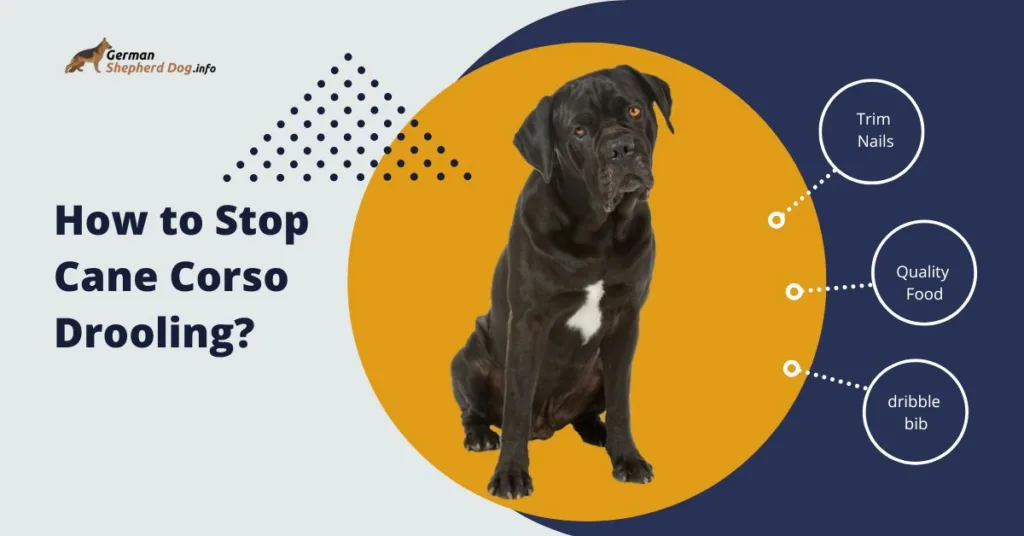Do Cane Corsos Drool? Although it is not uncommon for dogs to drool, the Cane Corso is a breed that sheds more than any other dog breed.
The Cane Corso is a mastiff breed and is known for its large size and impressive stature. These dogs are often confused with the Great Dane but they are actually two different breeds. The Cane Corso has a shorter coat and smaller ears, making them less intimidating than their larger counterparts.
Do Cane Corsos Drool Too much?
Yes, Cane Corsos do drool a lot. And there are a few reasons why.
- First, Cane Corsos are a very large breed of dog. And like all large breeds, they have a lot of loose skin around their mouths. This loose skin is what allows them to open their mouths so wide, and it also means that they produce more saliva than smaller breeds.
- Second, Cane Corsos are known for their powerful jaws. Their jaws are so strong that they can easily crush bones. And when they close their mouths, all that saliva has nowhere to go but out!
- Third, Cane Corsos are “working” dogs. That means they were bred to herd cattle and hunt pigs. And working dogs drool more than other breeds because they focus on what they’re doing.
How to Stop Cane Corso Drooling?

So, Cane Corsos drool so much, well, it’s just a combination of their size, their loose skin, and their powerful jaws. But, fortunately, there are a few things you can do to help keep the drooling to a minimum.
- First, make sure that your Cane Corso’s nails are trimmed short. Long nails can cause the skin around the mouth to stretch, which can lead to more drooling.
- Second, invest in a good quality dog food. A good quality dog food will help to keep your Cane Corso’s skin and coat healthy, which can also help to reduce drooling.
- And finally, if you’re really struggling with the drooling, you can always try a dribble bib! A dribble bib is a piece of cloth that goes around your Cane Corso’s neck and catches any drool that comes out.
So, there you have it! All the reasons why Cane Corsos drool, and a few tips on how to help reduce the drooling.
Also Read: Why Is My Dog’s Poop White? Things To Consider Before It Gets Serious
How Much Do Cane Corso Drool?
If you’re considering adding a Cane Corso to your family, you may be wondering about how much they drool. While all dogs produce saliva and therefore drool to some extent, some breeds are definitely more prone to slobbering than others. And the Cane Corso is definitely one of those breeds.
So, how much do Cane Corsos drool? It really varies from dog to dog, but you can expect your Cane Corso to drool more than the average dog. They produce a lot of saliva, and they’re also very good at drooling on things (and people!) when they’re excited or stressed. If you’re not a fan of dog drool, the Cane Corso may not be the right breed for you.
But it’s important to remember that every dog is different, and even within the Cane Corso breed, there will be some dogs who drool more than others. If you’re considering adding a Cane Corso to your family, it’s a good idea to meet with a few different breeders to get a sense of which dogs drool more and which ones don’t. That way, you can find the perfect Cane Corso for your family – one who drools just the right amount for you!
Do All Cane Corsos Drool? Male and Female?
The answer is both yes and no. Some cane corsos do drool more than others, but it really depends on the individual dog but not on gender. Some dogs drool more when they are excited or nervous, while others may just have naturally wet mouths.
There are a few things that can contribute to a dog drooling more than usual. If a dog is excited or nervous, they may produce more saliva than normal. This is completely normal and nothing to be concerned about. Dogs may also drool more when they are hot or thirsty. Again, this is normal and nothing to worry about.
However, if a dog is drooling excessively, it could be a sign of a more serious issue. Excessive drooling can be a sign of a medical condition, such as an infection, an allergy, or an underlying health problem. If your dog is drooling more than usual, it’s important to take them to the vet to rule out any potential medical issues.

